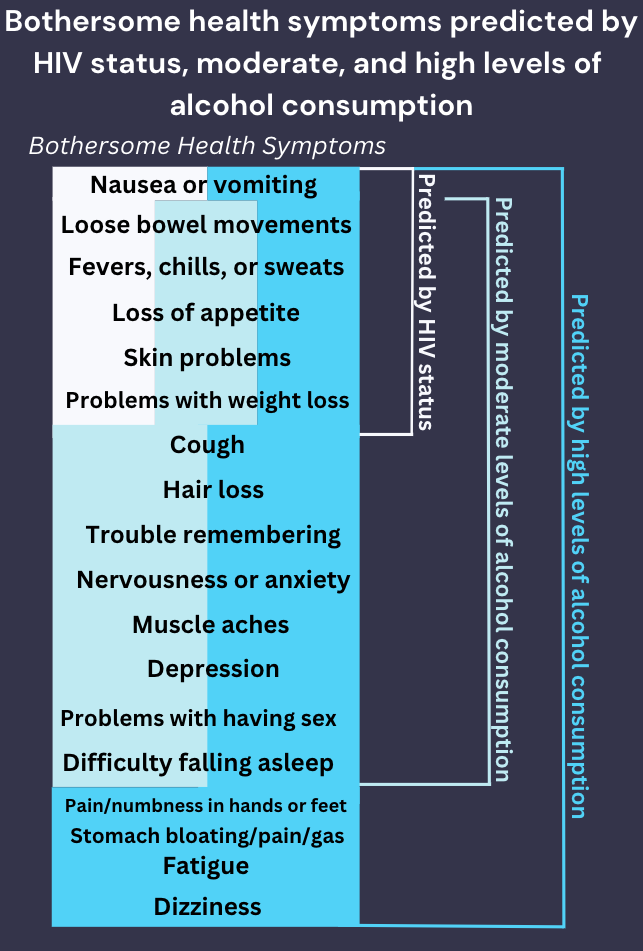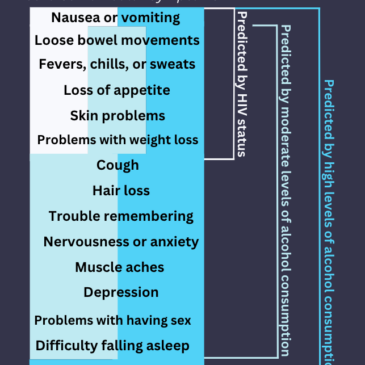Over 38 million people live with HIV globally, including 1 million living in the U.S. While antiretroviral therapies are effective in preventing disease progression and improving the quality of lives for people with HIV, many of these individuals still carry burdens stemming from negative symptoms such as insomnia, pain, weight gain, and nausea. Compared to people living without HIV, people living with HIV tend to be more susceptible to the negative effects of alcohol consumption, such as impaired memory and decision making. This week, The DRAM reviews a study by Anees Bahji and colleagues that examined whether there is a relationship between drinking alcohol and experiencing negative health burdens among people with and without HIV.
What was the research question?
Which bothersome symptoms are most common for people living with HIV? Does alcohol consumption lead to worsened health outcomes for people living with HIV?
What did the researchers do?
The researchers used longitudinal data from the (U.S.) Veterans Aging Cohort Study survey. The Veterans Aging Cohort Study is a multisite study of people with and without HIV who are receiving care from Veterans Affairs. The data analyzed in the study included surveys conducted between 2002 to 2018. Only participants who reported current alcohol use were included in their analyses. In total, the study included 7,509 participants, of whom 3,679 were living with HIV.
What did they find?
The most commonly reported bothersome symptoms were muscle/joint pain, sleep difficulties, fatigue, depression, and pain/numbness in the hands and feet. While HIV status predicted a number of bothersome health symptoms, the number of bothersome symptoms participants reported increased with their alcohol consumption. Specifically, people who consumed moderate levels of alcohol were more likely to experience thirteen of the twenty bothersome health symptoms measured in the study. People consuming high levels of alcohol were more likely to experience eighteen of the twenty bothersome health symptoms.

Figure. Bothersome health symptoms predicted by HIV status, moderate levels of alcohol consumption, and high levels of alcohol consumption. Click image to enlarge.
Why do these findings matter?
The findings of the study suggest that people with HIV experience significantly more bothersome health symptoms if they consume alcohol and that the number of symptoms experienced increases with their alcohol consumption. Some past research has found that alcohol use is common among people with HIV and that many meet the diagnostic criteria for alcohol use disorder. This suggests that targeting alcohol consumption behaviors among people with HIV may be an appropriate area for interventions. Cognitive behavioral interventions that provide personalized feedback to enrolled participants may be particularly effective in reducing alcohol use.
Every study has limitations. What are the limitations in this study?
The majority of participants (95%) were men. Similarly, women only accounted for a small percentage (2%) of the number of the people with HIV in the study. This means that the results of the study may not be generalizable to women and that women who consume alcohol may not experience the same bothersome symptoms as those reported in the study. Similarly, the study was conducted using a sample composed of veterans, which means that the results of the study may not generalize to non-veterans.
For more information:
The National Institute on Alcohol Abuse and Alcoholism has tips and resources for people struggling with problem drinking. For additional drinking self-help tools, please visit our Addiction Resources page.
— Seth McCullock, PhD
What do you think? Please use the comment link below to provide feedback on this article.




